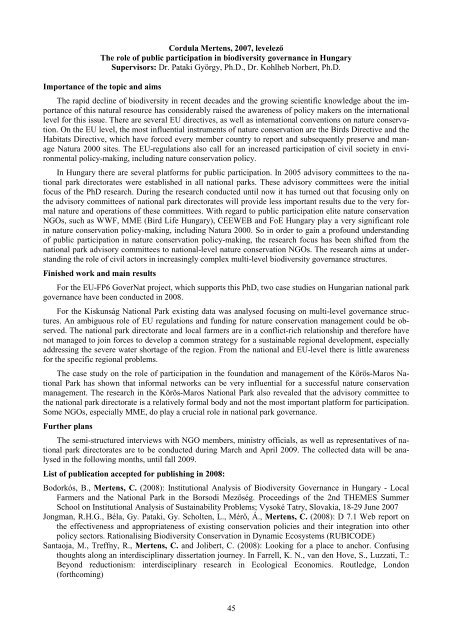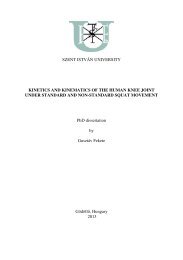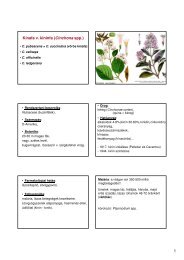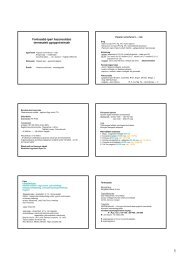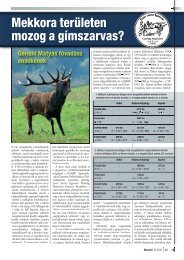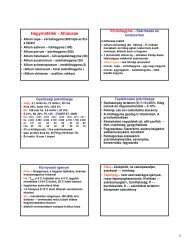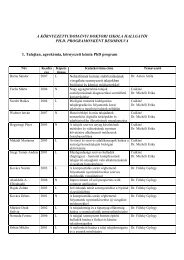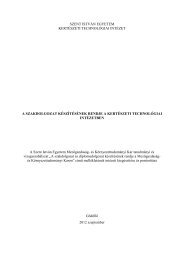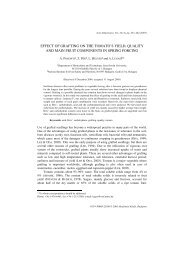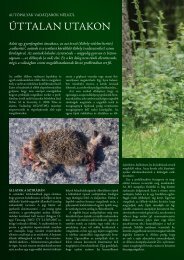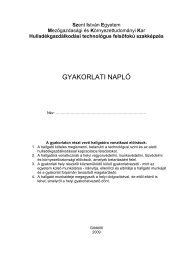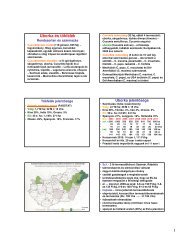doktori témaösszefoglalók - Környezettudományi Doktori Iskola ...
doktori témaösszefoglalók - Környezettudományi Doktori Iskola ...
doktori témaösszefoglalók - Környezettudományi Doktori Iskola ...
Create successful ePaper yourself
Turn your PDF publications into a flip-book with our unique Google optimized e-Paper software.
Cordula Mertens, 2007, levelezı<br />
The role of public participation in biodiversity governance in Hungary<br />
Supervisors: Dr. Pataki György, Ph.D., Dr. Kohlheb Norbert, Ph.D.<br />
Importance of the topic and aims<br />
The rapid decline of biodiversity in recent decades and the growing scientific knowledge about the importance<br />
of this natural resource has considerably raised the awareness of policy makers on the international<br />
level for this issue. There are several EU directives, as well as international conventions on nature conservation.<br />
On the EU level, the most influential instruments of nature conservation are the Birds Directive and the<br />
Habitats Directive, which have forced every member country to report and subsequently preserve and manage<br />
Natura 2000 sites. The EU-regulations also call for an increased participation of civil society in environmental<br />
policy-making, including nature conservation policy.<br />
In Hungary there are several platforms for public participation. In 2005 advisory committees to the national<br />
park directorates were established in all national parks. These advisory committees were the initial<br />
focus of the PhD research. During the research conducted until now it has turned out that focusing only on<br />
the advisory committees of national park directorates will provide less important results due to the very formal<br />
nature and operations of these committees. With regard to public participation elite nature conservation<br />
NGOs, such as WWF, MME (Bird Life Hungary), CEEWEB and FoE Hungary play a very significant role<br />
in nature conservation policy-making, including Natura 2000. So in order to gain a profound understanding<br />
of public participation in nature conservation policy-making, the research focus has been shifted from the<br />
national park advisory committees to national-level nature conservation NGOs. The research aims at understanding<br />
the role of civil actors in increasingly complex multi-level biodiversity governance structures.<br />
Finished work and main results<br />
For the EU-FP6 GoverNat project, which supports this PhD, two case studies on Hungarian national park<br />
governance have been conducted in 2008.<br />
For the Kiskunság National Park existing data was analysed focusing on multi-level governance structures.<br />
An ambiguous role of EU regulations and funding for nature conservation management could be observed.<br />
The national park directorate and local farmers are in a conflict-rich relationship and therefore have<br />
not managed to join forces to develop a common strategy for a sustainable regional development, especially<br />
addressing the severe water shortage of the region. From the national and EU-level there is little awareness<br />
for the specific regional problems.<br />
The case study on the role of participation in the foundation and management of the Körös-Maros National<br />
Park has shown that informal networks can be very influential for a successful nature conservation<br />
management. The research in the Körös-Maros National Park also revealed that the advisory committee to<br />
the national park directorate is a relatively formal body and not the most important platform for participation.<br />
Some NGOs, especially MME, do play a crucial role in national park governance.<br />
Further plans<br />
The semi-structured interviews with NGO members, ministry officials, as well as representatives of national<br />
park directorates are to be conducted during March and April 2009. The collected data will be analysed<br />
in the following months, until fall 2009.<br />
List of publication accepted for publishing in 2008:<br />
Bodorkós, B., Mertens, C. (2008): Institutional Analysis of Biodiversity Governance in Hungary - Local<br />
Farmers and the National Park in the Borsodi Mezıség. Proceedings of the 2nd THEMES Summer<br />
School on Institutional Analysis of Sustainability Problems; Vysoké Tatry, Slovakia, 18-29 June 2007<br />
Jongman, R.H.G., Béla, Gy. Pataki, Gy. Scholten, L., Mérı, Á., Mertens, C. (2008): D 7.1 Web report on<br />
the effectiveness and appropriateness of existing conservation policies and their integration into other<br />
policy sectors. Rationalising Biodiversity Conservation in Dynamic Ecosystems (RUBICODE)<br />
Santaoja, M., Treffny, R., Mertens, C. and Jolibert, C. (2008): Looking for a place to anchor. Confusing<br />
thoughts along an interdisciplinary dissertation journey. In Farrell, K. N., van den Hove, S., Luzzati, T.:<br />
Beyond reductionism: interdisciplinary research in Ecological Economics. Routledge, London<br />
(forthcoming)<br />
45


